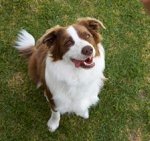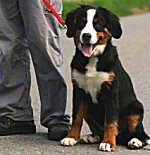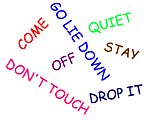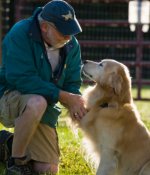French Bulldogs: What's Good About 'Em, What's Bad About 'Em
French Bulldog temperament, personality, training, behavior, pros and cons, advice, and information, by Michele Welton, Dog Trainer, Behavioral Consultant, Author of 15 Dog Books
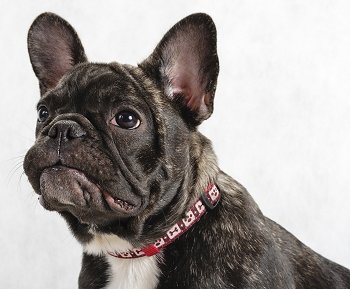
Despite his glum expression, the French Bulldog is comical, entertaining, and dependably amiable.
As comfortable in an apartment as he is on a farm, he is more lively than you might suspect from his chunky appearance. French Bulldog puppies are especially frisky, and ball chasing is one of their passions. Adults are more dignified and can be champion couch potatoes, but also love to clown around and go for walks in cool weather.
Many Frenchies are friendly with everyone, while others are politely reserved. French Bulldogs will bark to announce visitors, but are otherwise quiet dogs.
Usually peaceful with other pets (though some French Bulldogs will hunt small rodents), males may bicker with other males.
The French Bulldog is quite stubborn and can be challenging to train, yet also surprisingly sensitive, remembers what he learns, and responds well to early, patient, persistent training that utilizes food motivation.
Snorting, snuffling, and flatulence (gassiness) go with the territory of short-faced breeds.
Swimming pool owners must exercise caution: Because of his squat build and heavy head, most Frenchies cannot swim and will drown if they fall into a pool.
If you want a dog who...
- Is smallish but very sturdy – not a delicate lapdog
- Has large expressive eyes
- Has a sleek easy-care coat that comes in many colors
- Is usually polite with everyone, including other pets
- Typically loves to play games and chase balls
- Doesn't need much exercise
- Doesn't bark much
A French Bulldog may be right for you.
If you don't want to deal with...
- Snorting, snuffling, wheezing, snoring, some slobbering
- Gassiness (flatulence)
- Stubbornness
- Slowness to housebreak
- Quite a few potential health problems due to his deformed face
- High cost
A French Bulldog may not be right for you.
 |
Dog Breed Traits – Which Traits Are Right For You? In this brand new series, I'll help you decide which dog breed traits would best suit you and your family, your home and yard, and your lifestyle, so you can choose the best dog breed for your family. |
Keep in mind that the inheritance of temperament is less predictable than the inheritance of physical traits such as size or shedding. Temperament and behavior are also shaped by raising and training.
FREE eBooks by Michele Welton
![]() "Respect Training for Puppies" and "Teach Your Dog 100 English Words" are free step by step guides to teaching your pup to be calm and well-behaved.
"Respect Training for Puppies" and "Teach Your Dog 100 English Words" are free step by step guides to teaching your pup to be calm and well-behaved.
![]() "11 Things You Must Do Right To Keep Your Dog Healthy and Happy" is a free guide to keeping your dog mentally, physically, and emotionally happy and healthy so you can enjoy a longer lifetime of companionship.
"11 Things You Must Do Right To Keep Your Dog Healthy and Happy" is a free guide to keeping your dog mentally, physically, and emotionally happy and healthy so you can enjoy a longer lifetime of companionship.

- You can avoid some negative traits by choosing an ADULT dog from an animal shelter or rescue group. With an adult dog, you can easily see what you're getting, and plenty of adult Frenchies have already proven themselves not to have negative characteristics.
- If you want a puppy, you can avoid some negative traits by choosing the right breeder and the right puppy.
More traits and characteristics of the French Bulldog
If I was considering a French Bulldog, I would be most concerned about...
- Health problems. Unfortunately, these nice-tempered dogs are deliberately bred with structural deformities that detract from the dog's quality of life. They especially have trouble breathing. You need to protect them from heatstroke and if your summers get hot, your home needs to be air-conditioned. Along with respiratory disorders, Frenchies also suffer from spinal disorders, eye diseases, heart disease, and joint diseases. Read more about French Bulldog Health.
- French Bulldog sounds. Because of their short face, most Frenchies snort, snuffle, wheeze, grunt, and snore loudly. These sounds are endearing to some people; nerve-wracking to others.
- Slobbering. Some French Bulldogs, especially those with heavy loose lips, slobber water when they drink. Some drool, too, especially after eating and drinking.
- Gassiness (flatulence). All short-faced breeds gulp air when they eat, and that air has to go somewhere, after all. However, commercial diets make flatulence worse by including fibrous or hard-to-digest ingredients. French Bulldogs who are fed heavily meat-based diet have much less trouble with gassiness.
- Stubbornness. For such a small dog, French Bulldogs can be quite stubborn and manipulative. You must show them, through absolute consistency, that you mean what you say. Food is a great motivator for this breed, but it often results in a fat Frenchie who only obeys if you're waving a cookie. I recommend my more sensible training method, based on respect.
- Housebreaking. French Bulldogs can be quite slow to housebreak. Expect four to six months of consistent crate training.
My best-selling books – now available FREE on my website
 Respect Training For Puppies: 30 seconds to a calm, polite, well-behaved puppy is for puppies 2 to 18 months old. Your puppy will learn the 21 skills that all family dogs need to know. Click here to read for free.
Respect Training For Puppies: 30 seconds to a calm, polite, well-behaved puppy is for puppies 2 to 18 months old. Your puppy will learn the 21 skills that all family dogs need to know. Click here to read for free. Teach Your Dog 100 English Words is a unique Vocabulary and Respect Training Program that will teach your adult dog to listen to you and do what you say. Click here to read for free.
Teach Your Dog 100 English Words is a unique Vocabulary and Respect Training Program that will teach your adult dog to listen to you and do what you say. Click here to read for free. 11 Things You Must Do Right To Keep Your Dog Healthy and Happy helps your dog live a longer, healthier life. Get my honest advice about all 11 Things before you bring home your new puppy, because some mistakes with early health care cannot be undone. Click here to read for free.
11 Things You Must Do Right To Keep Your Dog Healthy and Happy helps your dog live a longer, healthier life. Get my honest advice about all 11 Things before you bring home your new puppy, because some mistakes with early health care cannot be undone. Click here to read for free.Related posts you might enjoy



